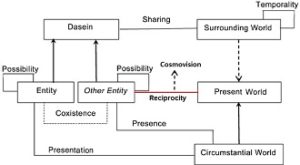
The originality of Being in Heidegger
The great question of Being in contemporary philosophy emerged from the thought of Martin Heidegger, a student of Husserl from which he inherited phenomenology as a method, essentially proposed to penetrate the question of being.
philosophy emerged from the thought of Martin Heidegger, a student of Husserl from which he inherited phenomenology as a method, essentially proposed to penetrate the question of being.
Although it has been studied by philosophy at all times, even Kantian idealism has an ontology that is displaced from Being to the subject, it already existed in Plato as an idea (Platonic eidos is not Kantian) and Aristotle as substance.
The being does not manifest directly, but always with the being of the being, you can play a joke with the contemporaneity that is the sick Being, because the Being of the Being is hidden in appearance.
One can seek pure Being in an ethereal existence of a God, but it is the existential door through man that one has access to Being, in this case Heidegger is applying the phenomenological method, he departs from man in fact (not idealized by example), let it manifest itself as it is and only then try to understand it in its manifestation after the presence.
Its first existence is being-in-the-world, one of the most widely accepted translations for Dasein, but as this being is also a Being-in-Situation, Heidegger’s careful reading can clarify this, I make a translation of being-being itself. – in the world, because Heidegger also uses the worldview (Weltanstchauung), which is open to the world and the cosmos, including the worldview.
This concept is important for Heidegger’s understanding of Being because it means this worldview as the circle of beliefs, affects, interests, and even philosophical concepts that Being has, even if it does not study philosophy, Being is “being-in-a-situation” that It does not mean just place or even context, but the very vision one sees in seeing the world, its “worldview”.
So many ideas and beliefs seem obvious to a person, but practically all of them are tied to temporal situations and thus limited by the “situation” in avise, that does not exclude thinking e the life.
This “abode” as an asceticism is described in the passage where the disciples ask the Rabbi (teacher), where He lives (Jn 1,38-39) and he said “Come and see”, they went and stayed with Him that day, where is your address?









